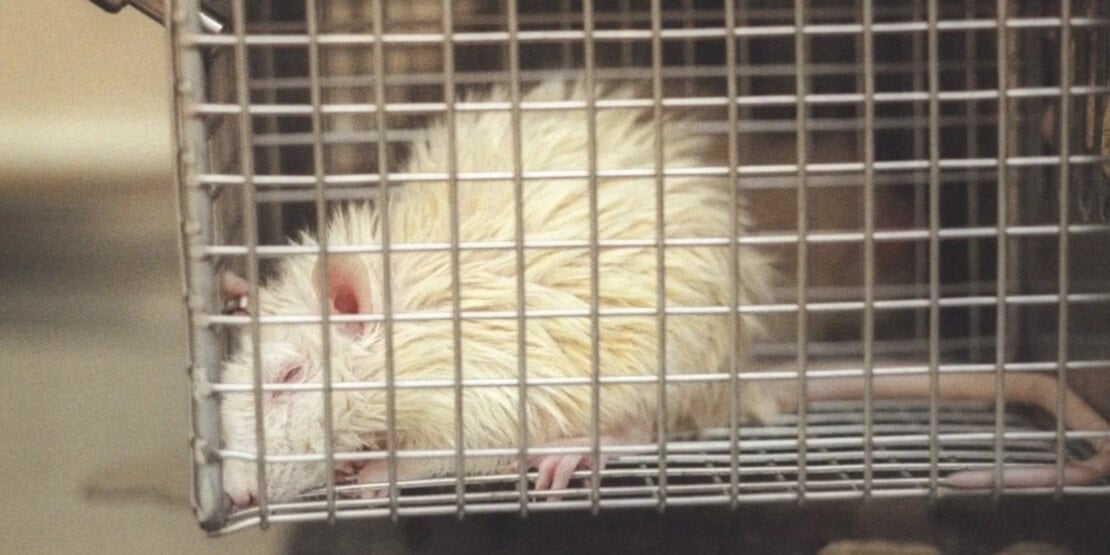Watch Tonight! New Documentary Film Series: ‘The Failed Experiment’
This Eye-Opening, True Story Takes You Inside Animal Labs
Here’s a question for you: Which of the following scenarios actually happened?
- Experimenters infected institutionalized children with hepatitis by making them drink chocolate milk mixed with feces from infected children.
- Experimenters injected terminally ill people with plutonium to determine how the toxic, radioactive chemical would spread through the body.
- A Harvard experimenter tore baby monkeys away from their mothers and sewed their eyes shut – forcing them into total darkness for a year.
- All of the above
No Consent and No Cures
If you guessed “All of the above,” you’re right. Just as humans who were incapable of giving consent were subjected to experiments before the experimenters were forced to stop, baby monkeys and other animals who can’t consent are being mutilated, poisoned, psychologically tormented, and killed in experiments today. And PETA’s groundbreaking new docuseries The Failed Experiment from executive producer Bill Maher reveals the extent and horror of it.

Experimenting on Animals Is Unethical and an Epic Failure
Most experiments on animals have nothing to do with human health and are egregiously cruel psychological ones. According to the US government, at least 92% of all medications that test safe and effective in animal trials fail in human clinical trials. “In any other field, a 92% failure rate would be completely unacceptable,” explains PETA Senior Vice President of Laboratory Investigations Kathy Guillermo. “If you’re saying, ‘Well, only 8% of the time does it work,’ it’s really time to find another way.”
“Testing on animals has nothing to do with human safety … they just do these tests to cover their a**es in the event of a lawsuit.”
– The director of toxicology at Biosearch, where a PETA undercover investigation revealed horrific cruelty
The Failed Experiment features interviews with experts who have worked inside this senseless system, including former primate experimenter John Gluck, PhD. He recalls having to suppress his empathy in order to work in an industry built on imprisoning and torturing sentient beings. “There were so many incidences where what we were doing to an animal gave me pause, and/or embarrassed me, or frightened me, or left me feeling guilty,” he says. “It got me thinking, ‘Who are these beings, and what do we owe them?’”
Curiosity Killed Many Cats
Gluck recounts how, after he decided to stop experimenting on animals, he sent monkeys from his lab to National Institutes of Health (NIH) experimenter Stephen Suomi – a decision he now deeply regrets. Years later, PETA exposed Suomi’s experiments, including one that involved heavily sedating mother monkeys and watching as their terrified infants screamed and clung to them. Following a PETA campaign bolstered by Gluck’s congressional testimony, NIH finally ended these experiments, which had gone on for 32 years yet hadn’t resulted in even one cure to alleviate anxiety, depression, or fear in humans.

Mabel was one of nearly 4,000 beagles liberated from laboratory supplier Envigo’s now-shuttered dog-breeding factory following PETA’s undercover investigation. Envigo pleaded guilty to federal crimes and was fined $22 million.
The series drops another bombshell: Most experimentation at universities is curiosity-based and done to allow experimenters to keep publishing papers, thereby keeping grant money coming in. One of these experiments that PETA exposed, at the University of Wisconsin, involved imprisoning, mutilating, and killing cats in futile “sound localization” tests. Following an intense PETA campaign, this laboratory shut down and the surviving feline victims were released for adoption.
PETA Pushes to Replace the Rubbish, Right the Wrongs
Innovative, animal-free research methods are challenging the status quo and accelerating treatments and cures.

In the series, Rich Ulmer relates how he learned firsthand about the unreliability of animal testing when the pharmaceutical company he formerly headed released an eye product that was deemed safe and effective in rabbits but caused serious adverse reactions in humans. Now, Ulmer leads InVitro International, which invented the first non-animal test accepted by the US government and provides researchers with superior methods for assessing chemicals – methods that don’t involve smearing substances on animals’ skin or applying them to their eyes.
“The people who experiment on animals will tell us that if they don’t do it, science is going to stop in its tracks,” Guillermo observes. “That’s the most significant lie. Science will rocket forward.”
Be Part of It!
Watch The Failed Experiment for free and share it with everyone you know. And please urge your legislators to support PETA’s Research Modernization Deal, a comprehensive strategy to propel science forward by replacing experiments on animals with state-of-the-art, human-relevant methods like organs-on-chips and other modern marvels.



